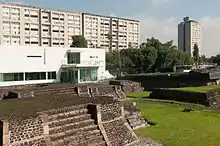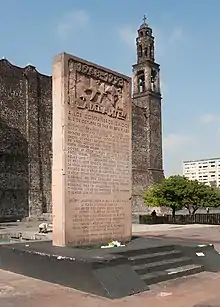Plaza de las Tres Culturas

The Plaza de las Tres Culturas ("The Three Cultures square") is the main square within the Tlatelolco neighborhood of Mexico City. The name "Three Cultures" is in recognition of the three periods of Mexican history reflected by buildings in the square: pre-Columbian, Spanish colonial, and the independent nation. The square, designed by Mexican architect and urbanist Mario Pani, was completed in 1966.[1][2]

The square contains the archaeological site of the city-state of Tlatelolco and is flanked by the oldest European school of higher learning in the Americas called the College of Santa Cruz de Tlatelolco[3] (built in 1536 by friar Juan de Torquemada[4][5]) and by a massive housing complex built in 1964.
The former headquarters of the Secretariat of Foreign Affairs (foreign ministry) also stands on the southern edge of the square. This headquarters now houses a memorial museum called "Memorial 68", opened by UNAM in October 2007,[6] to remember the 1968 Mexican student demonstrations and the Tlatelolco Massacre victims and survivors.[5] On the south side of the Plaza stands a large stone memorial erected on October 2, 1993, the 25th anniversary of the massacre, in memory of the hundreds killed.[7]
See also
- Unidad Habitacional Nonoalco-Tlatelolco
- Spanish Wikipedia: Memorial del 68−(in Spanish) — Google translation−(in English)
References
- Michael J. Lazzara; Vicky Unruh (2009). Telling Ruins in Latin America. Macmillan. pp. 108–111. ISBN 978-0-230-60522-0.
- Theis, Klaus. "Plaza of Three Cultures, Much Pain". Retrieved October 2, 2010.
- Steck; Francis Borgia (1936). The first college in America: Santa Cruz de Tlatelolco. Achievement and influence of Santa Cruz de Tlatelolco. Washington DC.
{{cite book}}: CS1 maint: location missing publisher (link) - "Plaza de las Tres Culturas". Frommers. Retrieved April 27, 2019.; for the role of Torquemada, see his Monarquía indiana, Lib. XVII, cap. 5
- DeLange, George & Audrey. "Plaza de las Tres Culturas". Archived from the original on September 26, 2010. Retrieved October 2, 2010.
- Arroyo, Sergio Raúl. "Mexico:The Power of Memory". Bulletin Supplement 6 (2009). German Historical Institute. p. 53. Archived from the original on July 18, 2011. Retrieved October 2, 2010.
Arroyo is the Director of CCUT, which houses the museum. - Doyle, Kate. "The Dead of Tlatelolco". George Washington University. National Security Archive. Retrieved April 27, 2019.